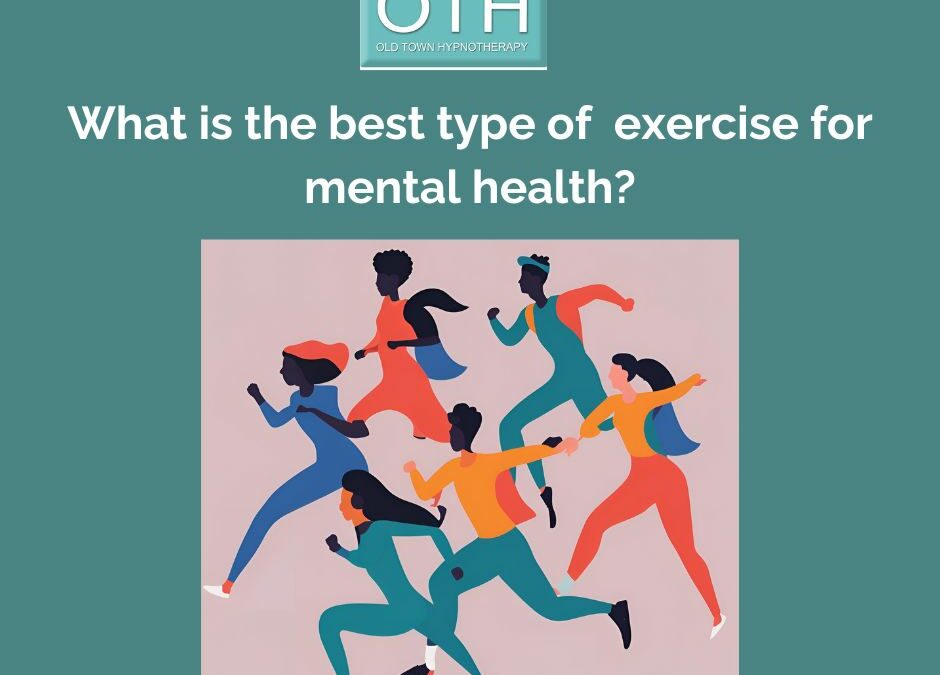
What is the Best Form of Exercise
for Mental Health?
We all know exercise is important for its physical benefits, in clinic we regularly discuss the significant impact exercise has on mental health too. Regular and enjoyable physical activity creates a powerful and positive feedback loop that enhances overall well-being. Those who have visited Old Town Hypnotherapy know about the 3P’s – Positive Activity, Positive Interaction and Positive thinking. Exercise is number one on the list of Positive Activity, way above any drug any Dr can give you to help support your mental health. But what exercise is best for our mental health, and why?
Cardio
One of the most beneficial forms of exercise for mental health is cardio, encompassing any exercise that raises your heartbeat and breathing rate, activities such as running, cycling, swimming, and dancing. Research has consistently shown that aerobic exercise triggers the release of endorphins, neurotransmitters that create feelings of happiness and euphoria. This phenomenon is commonly known as the “runner’s high” and is associated with improved mood and reduced feelings of stress and anxiety. Moreover cardio enhances the brain’s plasticity, which is the ability to adapt and form new neural connections. This is particularly beneficial for those suffering from depression, as it can facilitate improved emotional regulation. Engaging in aerobic activities for as little as 20-30 minutes, three times a week, can lead to noticeable improvements in mental health.
Strength Training
While cardio is often the focus when discussing mental health benefits, strength training is also a powerful ally. Lifting weights or engaging in body-weight exercises can drastically improve self-esteem and body image. As individuals see their physical strength increase, they often experience a corresponding boost in confidence and mental resilience. Research indicates that strength training can also reduce symptoms of depression and anxiety. A study published in the journal JAMA Psychiatry found that individuals participating in strength-training programs experienced significant reductions in depressive symptoms. The structured nature of strength training can provide a sense of accomplishment and routine, which is particularly helpful for those struggling with mental health issues.
Yoga and Mindfulness-Based Exercises
Yoga and other mind-body practices like tai chi and qigong have gained immense popularity, especially for their mental health benefits. These practices combine physical movement, breath control, and meditation, making them unique in promoting mindfulness and relaxation. The slow, deliberate movements and focus on breath can help reduce stress, lower blood pressure, and improve overall emotional well-being. Studies have shown that yoga can be particularly effective in treating anxiety and depression. A regular yoga practice can lead to a decrease in cortisol levels, the hormone associated with stress, and promote a sense of calm and stability. Furthermore, the meditative aspect of yoga encourages participants to stay present and cultivate self-awareness, aiding in emotional regulation and reducing rumination—common features of anxiety and depression.
Outdoor Activities
Engaging in exercise outdoors can amplify the mental health benefits of physical activity. Known as “green exercise,” this approach combines physical movement with the therapeutic effects of nature. Activities like hiking, biking, or simply walking in a park can elevate mood and reduce feelings of stress and anxiety. Research suggests that spending time in nature can promote psychological well-being. The Japanese practice of “forest bathing,” or Shinrin-yoku, emphasizes the mental health benefits of immersing oneself in a natural environment. Exposure to nature has been shown to lower cortisol levels, enhance mood, and even improve immune function. Consequently, outdoor exercise offers the dual benefit of physical activity and environmental connection.
Group Exercise
Exercise doesn’t have to be a solitary endeavour. In fact, social interaction during physical activities can significantly enhance mental health benefits. Group exercises—such as team sports, workout classes, or running clubs—provide opportunities for social support and connection. These interactions can alleviate feelings of loneliness and isolation, common experiences among individuals with mental health challenges. Participating in group activities can also cultivate a sense of belonging and purpose. The encouragement and camaraderie fostered in group settings can motivate individuals to maintain their exercise routines and commit to their mental health journey. Furthermore, sharing experiences with others can lead to the realization that one isn’t alone in their struggles, providing additional emotional support.
The best type of exercise for mental health in reality is anything you enjoy and can maintain, it doesn’t need to be pounding weights at the gym – a walk in a park will be beneficial. The variety of options is huge and accessible to many, so whether it be roller-skating or rugby, bouldering or badminton, any exercise can contribute significantly to reducing symptoms of anxiety and depression while enhancing overall well-being. The key to unlocking the mental health benefits of exercise lies in finding the activities that resonate most with you. Any movement is beneficial, and consistency is more important than the type of exercise chosen. As we strive for better mental health, incorporating exercise into our routines can provide a powerful tool for managing stress, enhancing mood, and improving overall quality of life. In clinic I often say that exercise should be like brushing our teeth, just something we do.
We offer completely free Initial Consultations at Old Town Hypnotherapy and we have clinic in Marlborough, Swindon and online.

